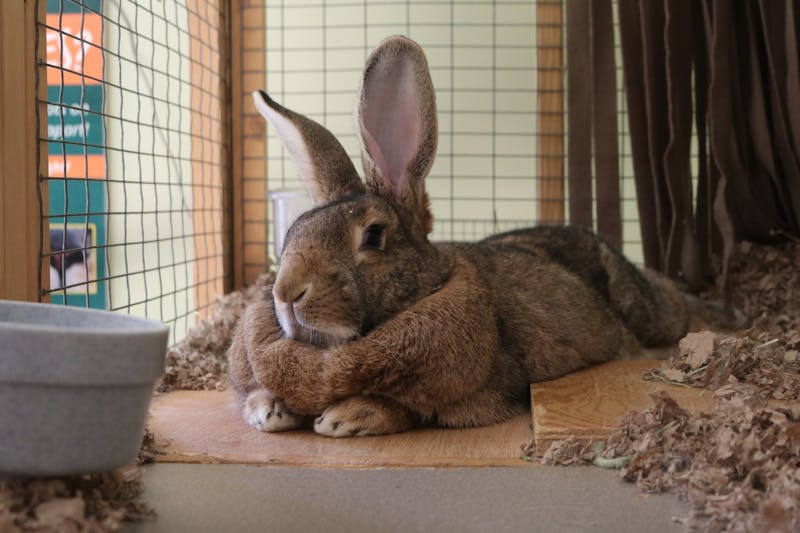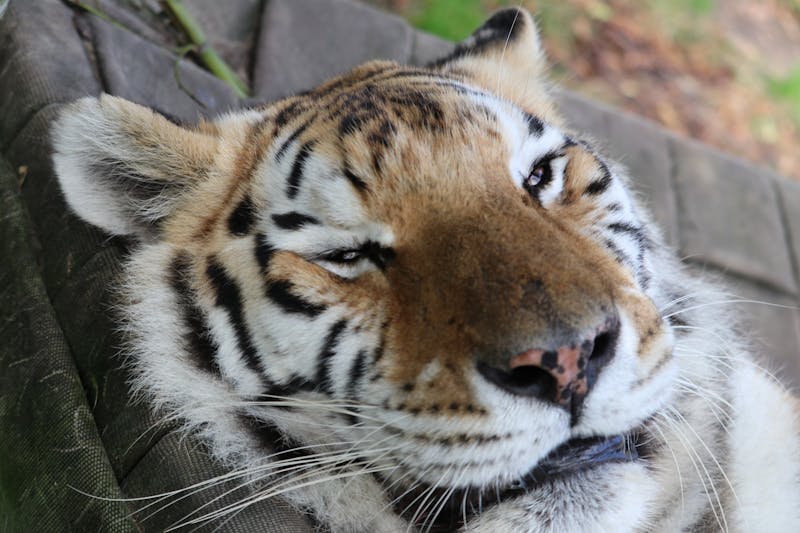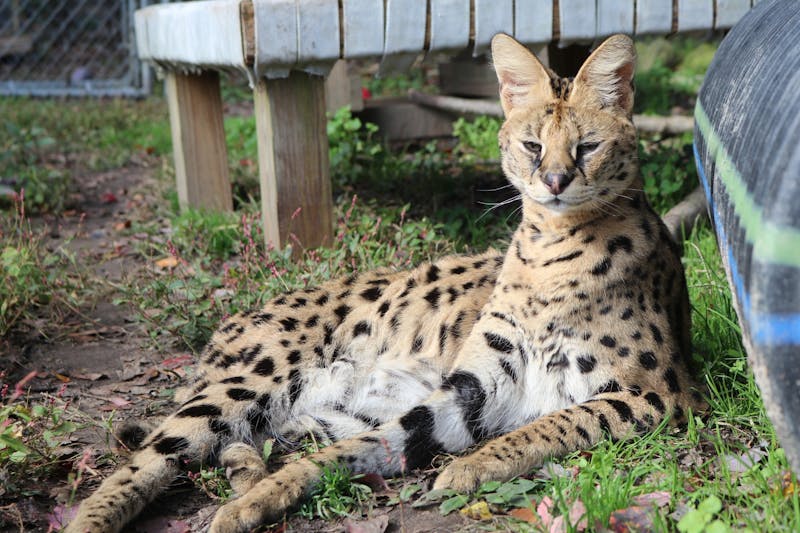Elise Gammon ‘20 has the dream job of anyone passionate about animals. Gammon is an education associate at Animal Park at the Conservators Center in Burlington, and despite the COVID-19 pandemic, she said zoos still play an important role in educating humans about animals and sparking excitement in people when they see an exotic creature.
“We think that people will become more passionate about learning about and protecting animals if they’ve had a real-life connection with them,” Gammon said.
Despite the overwhelming impact of the coronavirus, representatives from local zoos said that animal care must continue regardless of the status of the pandemic. The representatives said they hope to continue to educate the public while still following precautionary guidelines.
Video by Ellis Chandler
According to Gammon, the opportunity to look into an animal’s eyes can be a powerful moment for some zoo visitors. She said that having a visual interaction with an animal drives greater appreciation for visitors.
“We would love people to care about tigers or want to protect tigers,” Gammon said. “But if they really see one and can make eye contact with that animal and learn about it, they may be more driven to want to act more in order to protect that species.”
Gammon said at Animal Park, she serves as the summer camp coordinator and director and believes initiatives like the APEX program support the park’s mission through educating the public.
“I really agree that the mission is very true that most people are not as driven to care about causes that they can’t somewhat experience, or have some memory to recall why they’re invested in that cause,” Gammon said. “I think that’s a really big part of getting to see people even come to me or decide to donate or ask me for resources. That’s definitely very rewarding to be able to even just have a kid know an extra fact about an animal when they go home.”
Functioning amid COVID-19
The North Carolina Zoo in Asheboro — which is the world’s largest zoo — also dealt with the impact of COVID-19 and was closed for three months before reopening with limited capacity on June 15, according to public relations officer at the North Carolina Zoo Debbie Foster Fuchs.
Fuchs said that although the North Carolina Zoo has no relationship with the Conservators Center, they too have felt the impact of COVID-19. She said that the zoo has adhered closely to recommendations by the Department of Health and Human Services, and have focused on cleaning high touch surfaces.
“Employees wear masks, especially at the ticket counters,” Fuchs said. “Another thing we did was to try and make the zoo a one-way visit as much as possible, so people aren’t passing each other.”
In addition to increased cleaning and following protocols, Fuchs said that animal care has continued throughout the pandemic.
Gammon said that in the beginning of the pandemic, Animal Park took in a few lions from another facility. She said animals still have to find placement across the country.
“The zoological industry, it doesn’t really stop for a pandemic, but we still [have] protocols regardless,” Gammon said.
When new animals are brought to the park, that animal will be placed in quarantine and the people who can be around it would be limited, according to Gammon. She said that Animal Park wants to make sure the animals coming in do not have anything that could be contaminatinating to other animals or people working at or visiting the park.
Gammon said that prior to the coronavirus pandemic, those rules were already in place, therefore making it much easier for them to adapt to, and adjust as needed.
Alterations have also been made to the educational programs at the Animal Park, with opportunities to accommodate for in-person or virtual field trips.
“We offer virtual and in-person field trips, though the in-person ones are broken up into small groups and driven on site in smaller groups,” Gammon said. “Luckily, most of those students are students that have already been together; we’re not exposing them to anyone new except for the one tour guide, [who] will maintain social distance and so will all of them.”
Similar to Animal Park, the North Carolina Zoo also continues to offer virtual programs to promote education and animal awareness, according to Fuchs.
“We have a lot of community outreach programs [and] education programs that go into schools and obviously those had to stop,” Fuchs said. “We had converted a lot of our in person programs to what we call virtual visit.”
According to Fuchs, the virtual programs have become very popular and aid in promoting the zoo’s mission to “protect wildlife, protect wild places, conserve the world and inspire others to do that as well.”
School field trips at Animal Park are run similar to regular park tours, where tour guides are not just paying attention to the tour, but also focusing on physical distancing and all of the regulations, according to Gammon.
The internship program at the park for high school and college students has not been greatly impacted by COVID-19 because of its small size, Gammon said.
“We still have our interns right now since animal care still has to continue regardless of a pandemic,” Gammon said. “We want to make sure that everyone has supervision and is making sure that they’re doing everything correctly and safely. So for us, we’ve implemented all the CDC regulations when they’re there with us.”
Animals and quarantine
The quarantine process for animals looks similar to that of people, according to Gammon. During this period, animals will not receive treats and will participate in enrichment activities, where they will be provided with smells. She said the animals enjoy having exciting things and like to smell new scents as well.
According to Gammon, the park emphasizes limiting animal exposure to only keepers bringing them their daily food. This minimizes the spread of germs to not only the zoo animals but other people as well.
“It’s usually about a month of them in that quarantine, and we want to make sure that they’re comfortable,” Gammon said. “We want to find out if they want to be on the tour path [or] if they are more wanting to have their own space backstage. So kind of trying to learn the unique parts of each animal, you want to respect them as well.”
Since March and the beginning of the COVID-19 pandemic and widespread quarantine, the animals have been in the same groups, according to Gammon.
“I don’t believe anyone has changed who they live with for the time being, but since they don’t leave the park or anything we’re not too worried about them exposing each other,” Gammon said.
Following CDC rules and regulations
According to Gammon, Animal Park still values the importance of educating the community, and the team has taken measures to promote safety amongst the staff, visitors and animals as COVID-19 continues to spread across the state.
One factor that has become increasingly crucial is the following of CDC guidelines to ensure everyone is remaining safe and healthy.
The park is outdoors which aids in promoting physical distancing, according to Gammon. Additionally, the park is run solely on a tour guide basis, and group sizes can easily be minimized because of this.
“No one’s just wandering around the park,” Gammon said. “Each tour guide is able to tell people to maintain social distancing to try to make sure that people are keeping all procedures going accurately.”
At Animal Park, safety has also been promoted amongst the staff and according to Gammon, many are working remotely to minimize the chance of being a close contact or spreading germs.
“We are all working to try to spread out in our office space as we come in,” Gammon said. “A lot of people have chosen to work remotely, which has been great in a way to prevent too many people from being around.”
As a result of the minimal number of staff members, there has not been any worry surrounding the possibility of large gatherings or office meetings.
Gammon said that in contrast to office staff, animal keepers work outdoors and independently, caring for the animals, but are still required to adhere to strict guidelines, as felines have been found to be able to contract COVID-19.
“We are very strict about all of our guests in the park wearing their masks,” Gammon said.
Encouraged mask-wearing and guidelines extend to park volunteers and staff members as well, who must wear masks when preparing food for the animals to limit any sort of contamination or exposure, according to Gammon.





